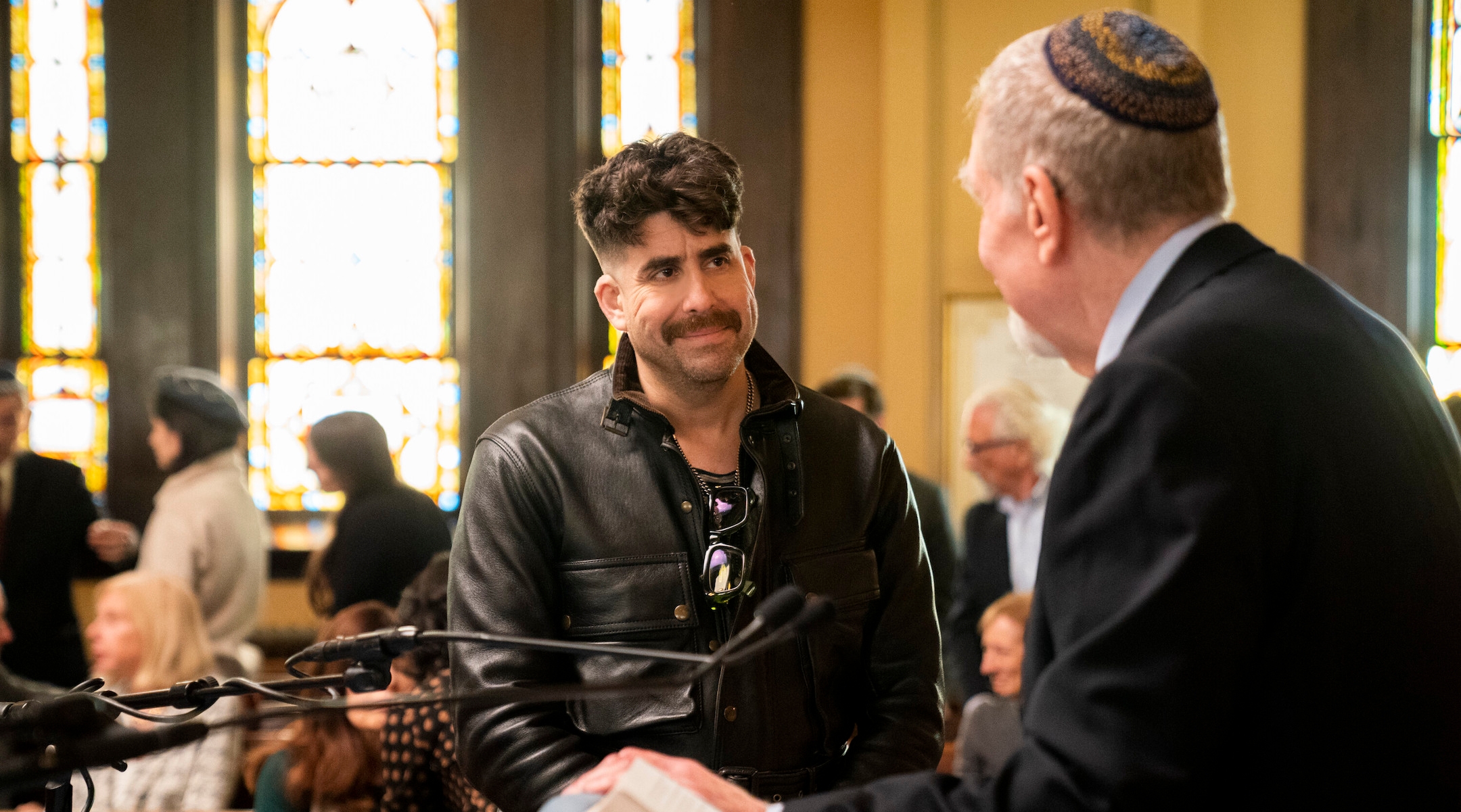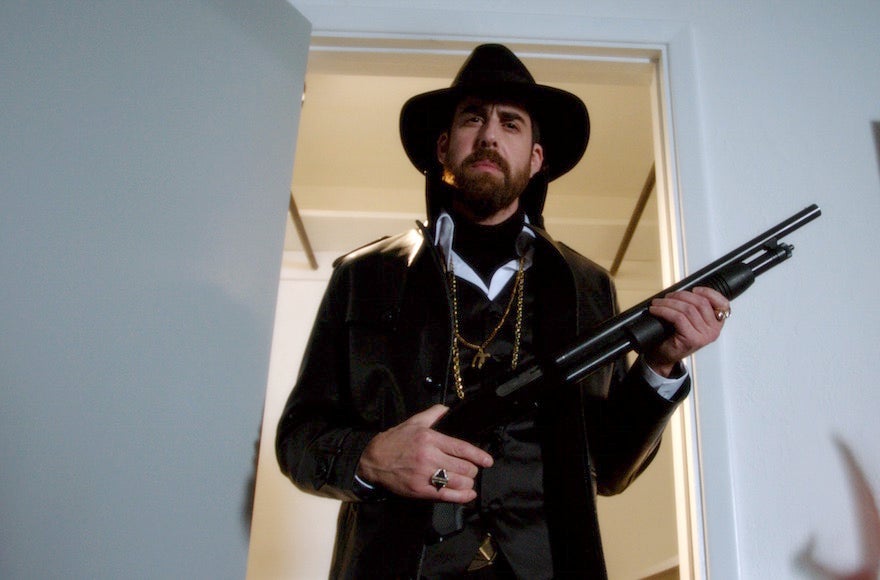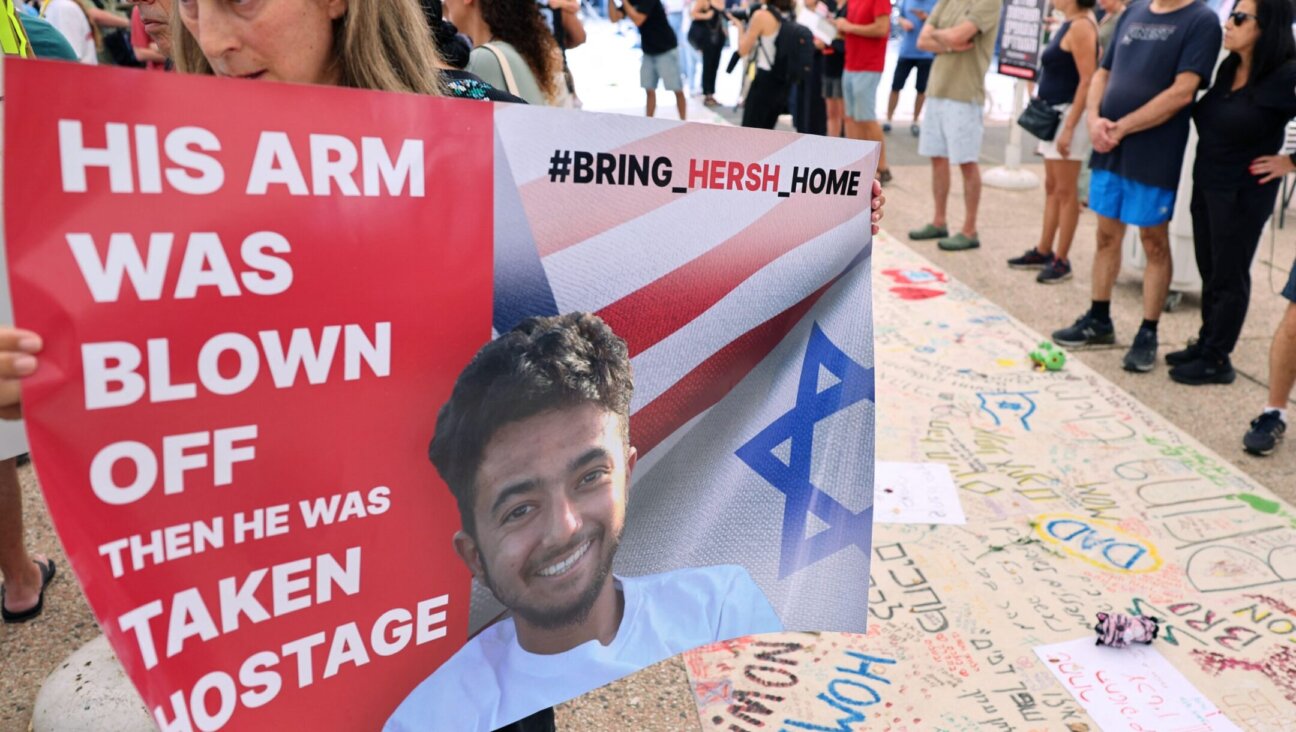In episode of CBS’ ‘The Equalizer,’ Adam Goldberg tackles antisemitic hate crimes in Brooklyn

Adam Goldberg as Harry Keshegian in an episode of “The Equalizer.” (Michael Greenberg/CBS)
(JTA) — Throughout his career, actor Adam Goldberg has been associated with iconic Jewish roles, from the hero in the kitschy 2003 action comedy “The Hebrew Hammer” to a Jewish soldier in Steven Spielberg’s Oscar winner “Saving Private Ryan.”
But for his latest role, on CBS crime procedural “The Equalizer,” Goldberg didn’t know his character had Jewish ancestry until recently, even though the show is in its third season.
On Sunday night, “The Equalizer” will air an episode called “Never Again,” in which a wave of hate crimes strikes Midwood, a heavily Jewish neighborhood in Brooklyn. These incidents hit close to home for Harry Keshegian, Goldberg’s character, a computer expert and Brooklyn native who is part of the show’s team of vigilante justice-seekers. (The series, which is set in New York and stars Queen Latifah, is a reboot of the show from the 1980s, which also spawned a series of films starring Denzel Washington.)
The Harry character has long been established as being of Armenian-American heritage. But for this episode, co-showrunner Adam Glass decided to add to Harry’s backstory, giving the character a Jewish mother as well as a complicated relationship with that side of his faith.
This comes to the forefront when the hate crimes, including vandalism and antisemitic threats, start to pile up. “Growing up with a Jewish mom and Armenian dad, I can’t say I knew where I stood in the community,” Harry says during the episode. “But I definitely know where I stand on hate crimes.”
Harry later describes himself as “someone who’s got a history of genocide on both sides of my family.” And like a lot of Jewish Americans, he was of the belief, at least until recently, that antisemitism in everyday life was mostly a problem of the past.
In dealing with a rabbi (played in the episode by veteran Jewish actor Richard Masur), who tries to react to the horrific events with humor, Harry gets some surprising answers about his family’s past and reconnects, to some degree, with his mother’s faith.
The episode was co-written by Glass and Ora Yashar, who are two of several Jewish writers on the show’s staff.
In working on the show, “we’re really lucky and fortunate that we not only get to entertain, but we get sort of tackle… subject matters that are in the news, and, unfortunately, are part of our society,” Glass told the Jewish Telegraphic Agency. “And obviously antisemitism is one of them.”
Goldberg, 52, whose extensive list of credits over the last 30 years also includes “Dazed and Confused” and a memorable guest arc on “Friends,” told JTA that, earlier in his career, he might not have been as comfortable with this sort of storyline, since it’s subject matter that he has explored before in other high-profile Jewish roles. In 2017, he attempted to put together a crowdfunding campaign to produce a “Hebrew Hammer” sequel inspired by the spike in online antisemitism at the time.

“Given just the unbelievable horrific uptick in hate crimes at large, and antisemitism in particular, it just felt like certainly my duty to go there, and also just keep it as grounded as possible,” he said.
The episode was shot at a synagogue in Brooklyn — for security reasons, the team’s publicist would not identify which one — and the team consulted with a rabbi about getting the Jewish touches right.
“I think one of the things that we wanted to just be mindful of is when we’re actually in a synagogue that we were getting things correct,” Yashar said. At the same time, she added, they wanted to get right the way Harry would behave, as someone who hadn’t been inside a synagogue or the Jewish community for many years.
“I found myself being much more sort of moved [and] affected by it than maybe I thought I would,” Goldberg said. “Particularly having explored this terrain in the past.”
Goldberg, like his character, has one Jewish and one non-Jewish parent; he describes his mother as a “hardcore disavowed Catholic.” He went to Jewish day school in Los Angeles from first through sixth grades, and like his character Harry, he drifted away from Jewish education prior to having a bar mitzvah.
“I certainly thought of myself as a Jewish person,” Goldberg said. “I think this is the thing which I grappled with, and I think many Jewish people grappled with — which is how they see themselves, and where they fit in in a world where people have so many different ideas about what it is to be a Jewish person.”
“Grappling with all that as an actor has made that all the more confusing, how to balance all of that,” he added.
Goldberg said he has gotten mostly positive reactions over the years from people who recognize him from his Jewish roles. But he’s mindful of the idea of being typecast as a “neurotic Jew” or “nice Jewish boy,” both of which he sees as tropes. And the reactions he has gotten have not always been as positive.
“I think in many ways I’ve been sort of forced, and then sort of proudly have come to own my Jewish identity,” he said, “and in the last several years and I’ve been on the receiving end of just an incredible amount of hate on social media.” Goldberg added that he has a photo album on his phone titled “Nazis,” featuring “screenshots of just the most horrific shit you can imagine.”
In “Saving Private Ryan,” Goldberg’s Jewish soldier character taunted Nazi prisoners by waving his Jewish star at them. Around that time, his name was featured on a white supremacist website, which in the late 1990s was a single page.
“I had no idea how bad shit was until the internet,” Goldberg said. “And how bad it’s gotten [in real life] since the internet.”
The two Jewish writers of the episode come from very different backgrounds. While Glass is an Ashkenazi Jew from New York, Yashar comes from an Iranian Jewish family.
“When I was growing up, I was told, ‘They’re white until they know you’re Jewish, don’t wear your Star of David,’” Glass said, echoing a comment by Harry on the show. “Those were things my bubbe [grandmother in Yiddish] said to me. And now I’m telling my kids the same things my bubbe said to me, unfortunately.”
A comic book store also features in the episode’s plot and is a nod to Glass’ other career: In addition to his work in television, Glass is a prolific author of comic books and graphic novels, having authored more than 150. He takes credit for putting Harley Quinn in the Suicide Squad DC comic series.
“I’m in two Jewish businesses,” Glass joked. “The comic book business, and the Hollywood business. Being creative is something that we as a people have always done.”
Yashar, who previously worked on the Netflix series “Atypical,” describes herself in her Twitter bio as “Iranian/Persian/OY Veyish.”
“One of the big things for this episode was that we can’t fight hate alone,” she said. “All marginalized communities, we all need to come together. Being a woman, being Iranian, and being Jewish, you know just my whole life experience has just been teaching me that all along.”
This article originally appeared on JTA.org.

I hope you appreciated this article. Before you go, I’d like to ask you to please support the Forward’s award-winning journalism this Passover.
In this age of misinformation, our work is needed like never before. We report on the news that matters most to American Jews, driven by truth, not ideology.
At a time when newsrooms are closing or cutting back, the Forward has removed its paywall. That means for the first time in our 126-year history, Forward journalism is free to everyone, everywhere. With an ongoing war, rising antisemitism, and a flood of disinformation that may affect the upcoming election, we believe that free and open access to Jewish journalism is imperative.
Readers like you make it all possible. Right now, we’re in the middle of our Passover Pledge Drive and we still need 300 people to step up and make a gift to sustain our trustworthy, independent journalism.
Make a gift of any size and become a Forward member today. You’ll support our mission to tell the American Jewish story fully and fairly.
— Rachel Fishman Feddersen, Publisher and CEO
Join our mission to tell the Jewish story fully and fairly.
Only 300 more gifts needed by April 30























